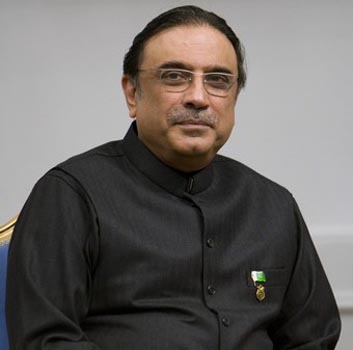Zardari emerges weaker after agreeing to restore deposed CJ: NYT
 Islamabad, Mar. 16 : Pakistan President Asif Ali Zardari's decision to restore deposed Chief Justice Iftikhar Mohammad Chaudhry, who was dismissed two years ago by then-President Pervez Musharraf, is being seen as a sign of weakness in certain circles in the country, the New York Times reports.
Islamabad, Mar. 16 : Pakistan President Asif Ali Zardari's decision to restore deposed Chief Justice Iftikhar Mohammad Chaudhry, who was dismissed two years ago by then-President Pervez Musharraf, is being seen as a sign of weakness in certain circles in the country, the New York Times reports.
According to the paper, the former chief justice's fate was a festering unresolved issue between Zardari and his arch rival and PML-Q chief Nawaz Sharif while the two men led a coalition government last year.
Zardari made what is generally considered a power grab on February 25 when introduced federal rule in Punjab.
Zardari, according to the NYT, was cornered after the federal government imposed Governor's rule in Punjab province following a Supreme Court verdict that disqualified Nawaz Sharif and his brother Shahbaz Sharif (who was then the Chief Minister of Punjab) from contesting elections because of the criminal cases lodged against them.
The dismissal of a duly elected provincial government, coupled with a vibrant lawyers' movement spurred an agitation against Zardari and the government led by Prime Minister Gilani that focused on ensuring Justice Chaudhry's return to his seat of authority, besides other key issues.
According to the NYT, Sharif used Chaudhry, as a symbol of an independent judiciary, the centerpiece of his platform since his return to Pakistani politics from exile in late 2007.
Word of Chaudhry's rehabilitation followed a momentous weekend in which the government had tried but failed to prevent a protest by Sharif and lawyers in Lahore.
After police placed him under house arrest on Sunday morning, Sharif and his entourage broke through the barricades at his home and drove to the center of Lahore, where a pitched battle took place between his supporters and the police.
But in apparent deference to Sharif, police melted away, and he proceeded from Lahore in a convoy of cars through the night along the 200-mile route to the capital.
During that trip, the prime minister appeared on television, and jubilant supporters of the chief justice rallied outside the home of Chaudhry in Islamabad.
Even before the formal announcement, Chaudhry was receiving elated lawyers and supporters at his house at 3 a. m.
Gilani said Chaudhry would take his seat on the Supreme Court on March 21, the day after the chief justice appointed by President Musharraf and favored by Zardari retired.
In his speech broadcast a few minutes before 6 a. m., the prime minister also lifted security restrictions imposed last Wednesday to try and deter protest by Sharif and his supporters.
Just before the prime minister spoke, Pakistani Television reported that roadblocks into the capital were being removed, a sign that Sharif and his supporters would apparently be welcome as victors, not protesters.
Sharif and Zardari fought over Chaudhry's future until their coalition fell apart last September over what Sharif said was Zardari's refusal to reinstate the chief justice.
Sharif accused Zardari of refusing to reinstate Chaudhry because he feared Chaudhry would repeal an amnesty on corruption charges that had been granted to Zardari and his wife, former Prime Minister Benazir Bhutto.
As chief justice, Chaudhry, a lawyer from Baluchistan, was an unusual maverick who was widely honored in the past year by universities and bar associations in the United States.
He had asked the Musharraf government to bring intelligence officials to his court to explain the disappearances of hundreds of Pakistanis believed held without charges since the American war on terrorism began in 2001.
Musharraf dismissed him on March 9, 2007, apparently because he believed that Chaudhry would prevent him from running for a third term. (ANI)